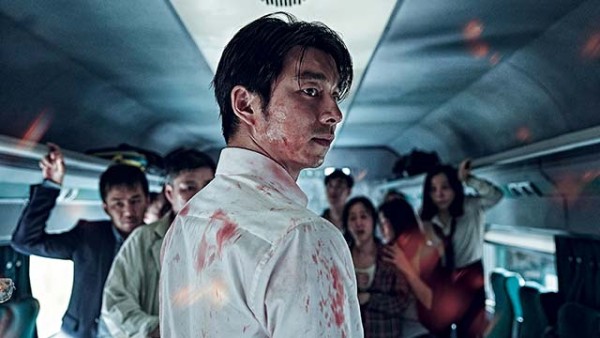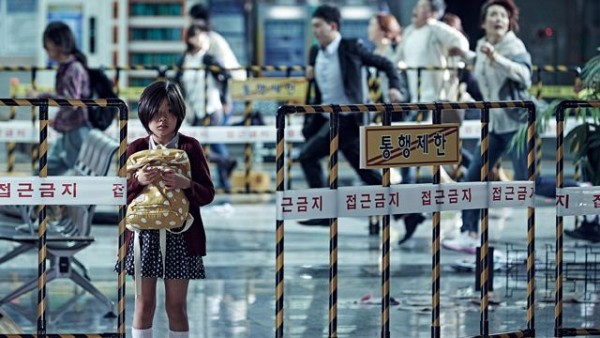
Courtesy of Well Go USA/ Contents Panda
Hot on the heels of its explosive debut at Cannes and its record breaking opening in South Korea, Train To Busan proved its mettle to a sold-out Fantasia Fest audience.
Let’s bitch it out…
After several years of boring and manipulative plotting on The Walking Dead and lazy, inept copycats, the zombie subgenre has felt tired for quite some time. If Train To Busan proves anything, it is just that we were waiting for the right person to come along and save us from the malaise. It appears that director Yeon Sang-ho is that man.
The plot is simple and straightforward: Seok-woo (Yoo Gong) is an absent, workaholic hedge fund manager escorting his precocious daughter Su-an (Kim Su-an) to Busan by high speed train to see his estranged wife. Unbeknownst to them (but evident to us from an amusing cold open involving a hit and run deer), South Korea is on the cusp of a zombie outbreak. The rules remain the same as always: a bite is enough to infect and convert, and if the infected manage to kill someone, they immediately turn. The actors playing the zombies are provided minimal makeup – prominently raised black and purple veins and milky contacts – relying primarily on their snarling and their herky-jerky movements to convey a sense of menace. Building on the lessons learned from 28 Days Later, they also move quickly, climbing atop one another, jumping off furniture and, when the occasion calls for it, creating such a momentous mass that they smash through glass enclosures (of which there are many on both the train and the passing stations).
Along the way we are introduced to various characters: a burly man, Sang (Ma Dong Seok) and his pregnant wife Sung (Yu-mi Jeong), a pair of old age grannies, a team of baseball players, an abrasive businessman and various other passengers who will inevitably be fodder for the forthcoming apocalypse. While the characters who will die are so obvious they might as well be wearing red shirts, half of the fun is seeing how and why people bite it. The inclusion of a human villain introduces additional conflict as selfish people make stupid decisions that repeatedly costs the lives of others for no good reason. Responsibility, selflessness and sacrifice are all recurring themes in a film that requires people to think and act on behalf of others to survive.
In the end, however, it is the high octane action that helps to make Train To Busan so damn enjoyable. The bloodletting starts early: the first attack occurs mere minutes after the passengers have been sealed in their train cars on the one hour journey to Busan. The back and forth linear movement between the cars and the limited obstacles preventing a massacre (glass doors at the end of each car, as well as bathrooms) suggests that the narrative will have to move off the train in order to sustain the film’s 1 hour and 45 minute runtime. This is part of Train To Busan’s genius: Sang-ho has a series of creative solutions to keep the momentum going, including several adrenaline spiking set-pieces that had the sold-out audience on the edge of their seats and cheering.

Courtesy of Well Go USA / Contents Panda
One favourite features an ill-advised stop at a station that is supposedly under national guard protection. As the group of wary survivors make their way through the abandoned station and down a slow-moving escalator, the tension of the inevitable reveal ramps up. When the infected soldiers are eventually revealed, the ensuing pandemonium is heavy on casualties and high on adrenaline as passengers divide into three groups: one group must re-enter the train without releasing the zombies locked in the cars, one must fend off the mass of zombies throwing themselves atop the top of the train while the third group attempts to seal a set of glass station doors to allow time for escape. The other stand-out sequence involves a motley trio who must make their way through the hordes of three different cars using only minimal, unconventional weapons and the cover of dark provided by tunnels (a unique twist is that the zombies are motivated by sight and sound so when they cannot see or hear their prey, they are effectively docile). The sequence is reminiscent of a similarly great setpiece in Snowpiercer.
If Train To Busan has one issue, it is its runtime. After one particularly emotional loss, there is a natural opportunity to wrap the film up, but instead the film continues on for nearly 30 minutes more. While these final scenes contribute to the film’s themes by paying-off the father-daughter relationship and pit Seok-woo against the human villain one last time, this could have been trimmed to help with the pacing. Instead it feels as though screenwriter Park Joo-suk is so enamoured with his characters that he cannot let them go, which results in a long drawn-out conclusion. Still, it is a minor complaint considering how entertaining this adrenaline-fuelled action film is.
Bottom Line: A simple premise executed with precision, punctuated by memorable action sequences and featuring a great hissable human villain, Train To Busan is a memorable example of how the zombie subgenre still has a lot of life left in it.
Train To Busan screens once more at Fantasia Fest on July 31 at 11:30am. Here’s the trailer: